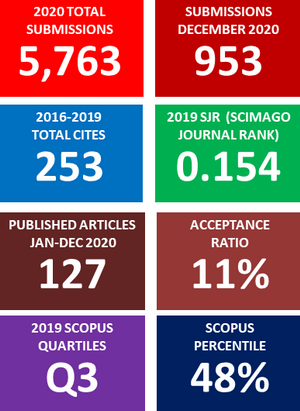Social Responsibility Behaviors among Universities Students in the 3 Southern Border Provinces of Thailand in the Period of Corona Virus 2019 (COVID-19) Pandemic
DOI:
https://doi.org/10.48048/wjst.2020.10066Keywords:
Social responsibility, COVID-19, Transmission, Knowledge, AttitudeAbstract
The objectives of this cross-sectional research were to study university students’ knowledge on COVID-19 transmission, their attitude toward the measures of COVID-19 prevention and control, social responsibility behaviors, and factors association with participants’ social responsibility behaviors. The population from 3 universities were 17,765 students, the sample size was at least 376 participants according to Krejcie and Morgan’s formula. Purposive sampling was employed to select the target participants. Then, each student shared the questionnaire link with their friends. The self-administered questionnaires were distributed by using Google Forms. The content validity was evaluated by 3 experts; the Index of Item-Objective Congruence (IOC) of each item of all part was 1 and the coefficient of reliability knowledge and attitude were more than 0.70. The links of each Google Form was sent through Facebook and Line contact friends and asked them for distribution to others. The were 416 students who completed the questionnaires. Descriptive statistics were used to analyze the data, while for the association study, Chi-square and Binary logistic regression were used. The results disclosed that the university students had the knowledge of Covid-19 transmission at Moderate level (50.72 %), and had the attitude of the state measures for Covid-19 prevention and control in High level (81.01 %). Additionally, their social responsibility behaviors for COVID-19 prevention and control were in High level (57.21 %). The knowledge on Covid-19 transmission was significantly associated with social responsibility behaviors among university students (p-value < 0.05) as well as their attitude on the state measures for Covid-19 prevention and control that was significantly associated with university students’ social responsibility behaviors (p-value < 0.01).
Downloads
Metrics
References
Z Feng, Q Li and Y Zhang. The epidemiological characteristics of an outbreak of 2019 novel Coronavirus diseases (COVID-19) - China, 2020. China CDC Weekly 2020; 2, 113-22.
The Communicable Diseases Network Australia. CDNA National Guidelines for the Prevention, Control and Public Health Management of COVID-19 Outbreaks in Residential Care Facilities in Australia. 2020, Available at: https://www.health.gov.au/resources/publications/coronavirus- covid-19-guidelines-for-outbreaks-in-residential-care-facilities, accessed April 2020.
J Tsai and M Wilson. COVID-19: A potential public health problem for homeless populations. Lancet Public Health 2020; 5, 186-7.
J Bedford, D Enria, J Giesecke, DL Heymann, C Ihekweazu, G Kobinger, HC Lane, Z Memish, MD Oh, AA Sall, A Schuchat, K Ungchusak and LH Wieler. COVID-19: Towards controlling of a Pandemic. Lancet 2020; 395, 1015-8.
CR Telles. COVID-19: A brief overview of virus social transmission through atmosphere. MediArXiv 2020. https://doi.org/10.33767/osf.io/2hek4.
UNHCR. Coronavirus Emergency Appeal UNHCR’s Preparedness and Response Plan (REVISED). UNHCR, Geneva, 2020, p. 1-3.
MS Wolf, M Serper, L Opsasnick, RM O'Conor, L Curtis, JY Benavente, G Wismer, S Batio, M Eifler, P Zheng, A Russell, M Arvanitis, D Ladner, M Kwasny, SD Persell, T Rowe, JA Linder and SC Bailey. Awareness, attitudes, and actions related to COVID-19 among adults with chronic conditions at the onset of the U.S. outbreak: A cross-sectional Survey. Ann. Intern. Med. 2020; 173, 100-9.
A Narware and A Hasan. COVID-19: Social aspects and responsibilities. Electron. Res. J. Soc. Sci. Human. 2020; 2, 39-44.
T Abel and McQueen. The COVID-19 pandemic calls for spatial distancing and social closeness: Not for social distancing! Int. J. Public Health 2020; 65, 231.
B Oosterhoff and CA Palmer. Psychological Correlates of News Monitoring, Social Distancing, Disinfecting, and Hoarding Behaviors among US Adolescents during the COVID-19 Pandemic. Department of Psychology Montana State University, Bozeman, MT 59717-3440 USA, 2020, p. 1-20
N Soykeabkaew, N Tawichai, C Thanomsilp and O Suwantong. Nanocellulose-reinforced “Green” composite materials. Walailak J. Sci. & Tech. 2017; 14, 353-68.
Education Service. Educational Statistic. Yala Rajabhat University, 2019.
Registration Office. Student Statistics. Prince of Songkhla University, Pattani campus, 2019.
Division of Academic and Student Affair Office. Students Report. Princess of Naradhiwas University, 2019.
RV Krejcie and DW Morgan. Determining sample size for research activities. Educ. Psychol. Meas 1970; 30, 607-10.
BS Bloom. Taxonomy of Education Objective, Handbook I: Cognitive Domain. David Mckay, New York, 1976.
Downloads
Published
How to Cite
Issue
Section
License
Copyright (c) 2020 Walailak University

This work is licensed under a Creative Commons Attribution-NonCommercial-NoDerivatives 4.0 International License.













